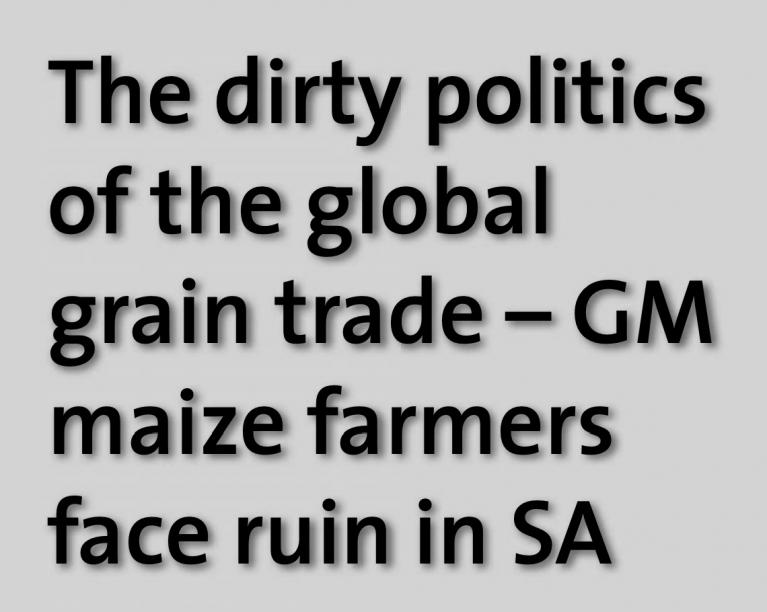Latest Resources

9 January 2012
ACB comments on biofuels mandatory blending
The African Centre for Biodiversity hereby lodges its objections and comments to the draft regulations regarding the mandatory blending of biofuels with petrol and diesel. Read here.

9 May 2011
Critique of SANBI’s Studies on Monsanto’s MON 810
During early in 2011, the South African National Biodiversity Institute (SANBI) published a report titled, Monitoring the Environmental Impacts of GM Maize in South Africa. The report was a culmination of a study by the Environmental Biosafety Cooperation Project (EBCP) aimed at developing a framework for monitoring of insect resistant maize, Mon810, belonging to Monsanto. […]

8 December 2010
Competition Commission rejects Pioneer Hi Bred seed takeover
Media Advisory from the African Centre for Biosafety Johannesburg, 8th December 2010. The African Centre for Biosafety applauds the decision of the Competition Commission not to approve the take-over of Pannar Seed, South Africa’s largest seed company, by the multinational corporation and seed giant, Pioneer Hi-Bred, a subsidiary of the DuPont chemical company. The ACB […]

3 December 2010
Deep concern: Patel’S New Growth Path (NGP) supports Green Revolution for smallholder farme...
Dear friends and colleagues, The ACB is deeply disturbed and disappointed that Minister Patel’s NGP has not embraced new thinking on agriculture policy which requires breaking from a wholly inequitable and ecologically unsustainable chemical-dependent system. The NGP lacks vision as it has missed an important moment to move South Africa towards systems that reconnect food […]

8 September 2010
The dirty politics of the global grain trade – GM maize farmers face ruin in SA
Recently, the South African press reported on the possible bankruptcy faced by maize farmers. The African Centre for Biosafety (ACB) has today released a new report titled “The dirty politics of the global grain trade – GM maize farmers face ruin in SA” which provides an analysis of why South Africa’s record 13 million ton […]

13 August 2010
GM Sorghum: Africa’s Golden Rice
In this paper, we critically analyse the African Biofortified Sorghum (ABS) project, a GM ‘poster project’ in Africa. We dig beneath the veneer of the project being an “African led solution” to poverty and malnutrition on the continent. We also focus attention on the myriad of sorghum research initiatives currently underway in Africa, using both […]

12 May 2010
Traceability, segregation and labelling of genetically modified products in South Africa: A Posit...
South Africa has promulgated national legislation, the Consumer Protection Act (CPA), which creates an opportunity for the mandatory labelling of certain foodstuffs containing or which are genetically-modified organisms (GMOs). The Act sets out a number of consumer rights that have relevance to the sale of products with genetically modified components. These include the right to […]

17 April 2010
Scottish Parliament Motion on GM entry refusal, Kenya, South Africa
*S3M-6119 Bill Wilson: Biodiversity Coalition Opposes GM Contamination. That the Parliament notes reports that 40,000 tons of genetically modified (GM) maize from South Africa have been refused entry to Kenya as a result of protests led by the Kenya Biodiversity Coalition. Further notes, with reference to motion S3M-05873 by Bill Wilson ‘Who Benefits from GM […]

7 February 2010
A profile of Monsanto in South Africa
Monsanto is a globally dominant company in the agrochemical, seed and agricultural biotechnology sector. It has been active in the agrochemicals market in South Africa since 1968, and now owns almost all traits used in the South African GM crop market. Thanks to the purchase of local seed companies, Sensako and Carnia, in the late […]

7 February 2010
Bilateral biosafety bullies: How corporations use bilateral trade channels to weaken biotech regu...
Across the world, the use of bilateral trade instruments to prise open markets for genetically modified (GM) crops is escalating. To expand business overseas, the biotech industry needs stronger intellectual property rules and weaker biosafety standards. Bilateral trade deals are an effective way to do this. This report looks specifically at how the world’s grain […]
